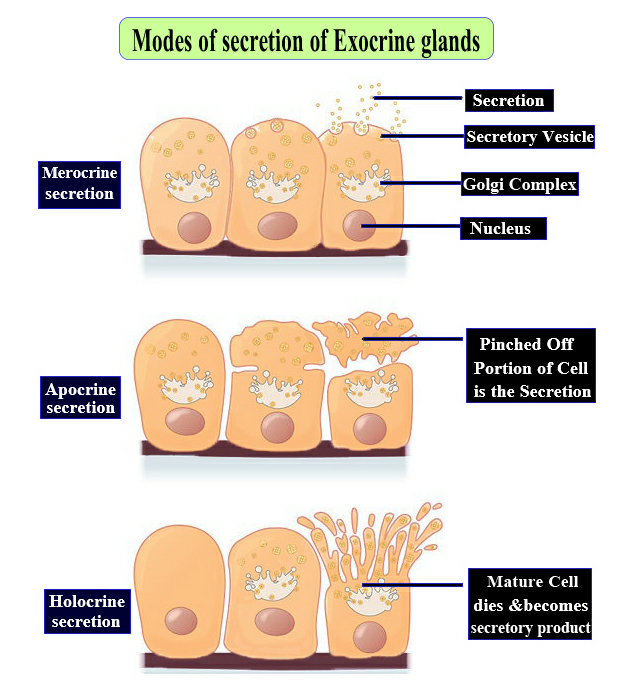
Which of the following is an example of the merocrine gland?
(a) Sebaceous gland
(b) Pineal gland
(c) Salivary gland
(d) Mammary gland
Answer
581.1k+ views
Hint: Merocrine glands are the most commonly found exocrine glands in our body and they secrete their secretions stored in secretory vesicles by exocytosis.
Complete Step by Step Answer:
‘Salivary gland' is a type of merocrine gland as its secretion i.e. saliva is secreted into the buccal cavity by exocytosis. It does not cause any damage or degeneration of its constituent cells. Some other merocrine glands are the sweat gland and pancreatic gland.
The salivary glands facilitate proper digestion of food and initiate the breakdown of starch present in ingested food.

So, the correct answer is ‘Salivary gland'.
Additional Information:
The endocrine glands if our body can broadly be divided into Merocrine, Apocrine (mammary gland) , and Holocrine glands (sebaceous gland) .
Mammary glands: They are the milk- producing glands present in all mammals. Here, a small apical portion of the duct forms an outpouching and it then detaches itself to release the secretion. It also causes a small loss of cytoplasm. These are called Apocrine glands.
Sebaceous glands: They are responsible for the production of sebum over the skin. Here, the whole cellular membrane ruptures to release its contents into the duct. It also leads to the death of cells. These are called Holocrine glands. The meibomian gland is also an example of a holocrine gland.
Pineal gland: It is an endocrine gland situated behind the third ventricle of the brain. It maintains the circadian rhythm of the body.
Note:
- While the ducts release the secretions of glands at their respective sites, the secretions of endocrine glands are prepared in the specialized cell called Acinus.
- Merocrine glands are also known as ‘eccrine glands'.
- The merocrine sweat glands present in the skin are responsible for eliminating molecules like sodium chloride, potassium, bicarbonate, etc. in order to maintain proper osmotic balance and cooling of the body surface.
- Human beings possess three pairs of salivary glands namely the parotid, submaxillary, and sublingual glands.
Complete Step by Step Answer:
‘Salivary gland' is a type of merocrine gland as its secretion i.e. saliva is secreted into the buccal cavity by exocytosis. It does not cause any damage or degeneration of its constituent cells. Some other merocrine glands are the sweat gland and pancreatic gland.
The salivary glands facilitate proper digestion of food and initiate the breakdown of starch present in ingested food.

So, the correct answer is ‘Salivary gland'.
Additional Information:
The endocrine glands if our body can broadly be divided into Merocrine, Apocrine (mammary gland) , and Holocrine glands (sebaceous gland) .
Mammary glands: They are the milk- producing glands present in all mammals. Here, a small apical portion of the duct forms an outpouching and it then detaches itself to release the secretion. It also causes a small loss of cytoplasm. These are called Apocrine glands.
Sebaceous glands: They are responsible for the production of sebum over the skin. Here, the whole cellular membrane ruptures to release its contents into the duct. It also leads to the death of cells. These are called Holocrine glands. The meibomian gland is also an example of a holocrine gland.
Pineal gland: It is an endocrine gland situated behind the third ventricle of the brain. It maintains the circadian rhythm of the body.
Note:
- While the ducts release the secretions of glands at their respective sites, the secretions of endocrine glands are prepared in the specialized cell called Acinus.
- Merocrine glands are also known as ‘eccrine glands'.
- The merocrine sweat glands present in the skin are responsible for eliminating molecules like sodium chloride, potassium, bicarbonate, etc. in order to maintain proper osmotic balance and cooling of the body surface.
- Human beings possess three pairs of salivary glands namely the parotid, submaxillary, and sublingual glands.
Recently Updated Pages
Master Class 11 Computer Science: Engaging Questions & Answers for Success

Master Class 11 Business Studies: Engaging Questions & Answers for Success

Master Class 11 Economics: Engaging Questions & Answers for Success

Master Class 11 English: Engaging Questions & Answers for Success

Master Class 11 Maths: Engaging Questions & Answers for Success

Master Class 11 Biology: Engaging Questions & Answers for Success

Trending doubts
One Metric ton is equal to kg A 10000 B 1000 C 100 class 11 physics CBSE

There are 720 permutations of the digits 1 2 3 4 5 class 11 maths CBSE

Discuss the various forms of bacteria class 11 biology CBSE

Draw a diagram of a plant cell and label at least eight class 11 biology CBSE

State the laws of reflection of light

10 examples of friction in our daily life




